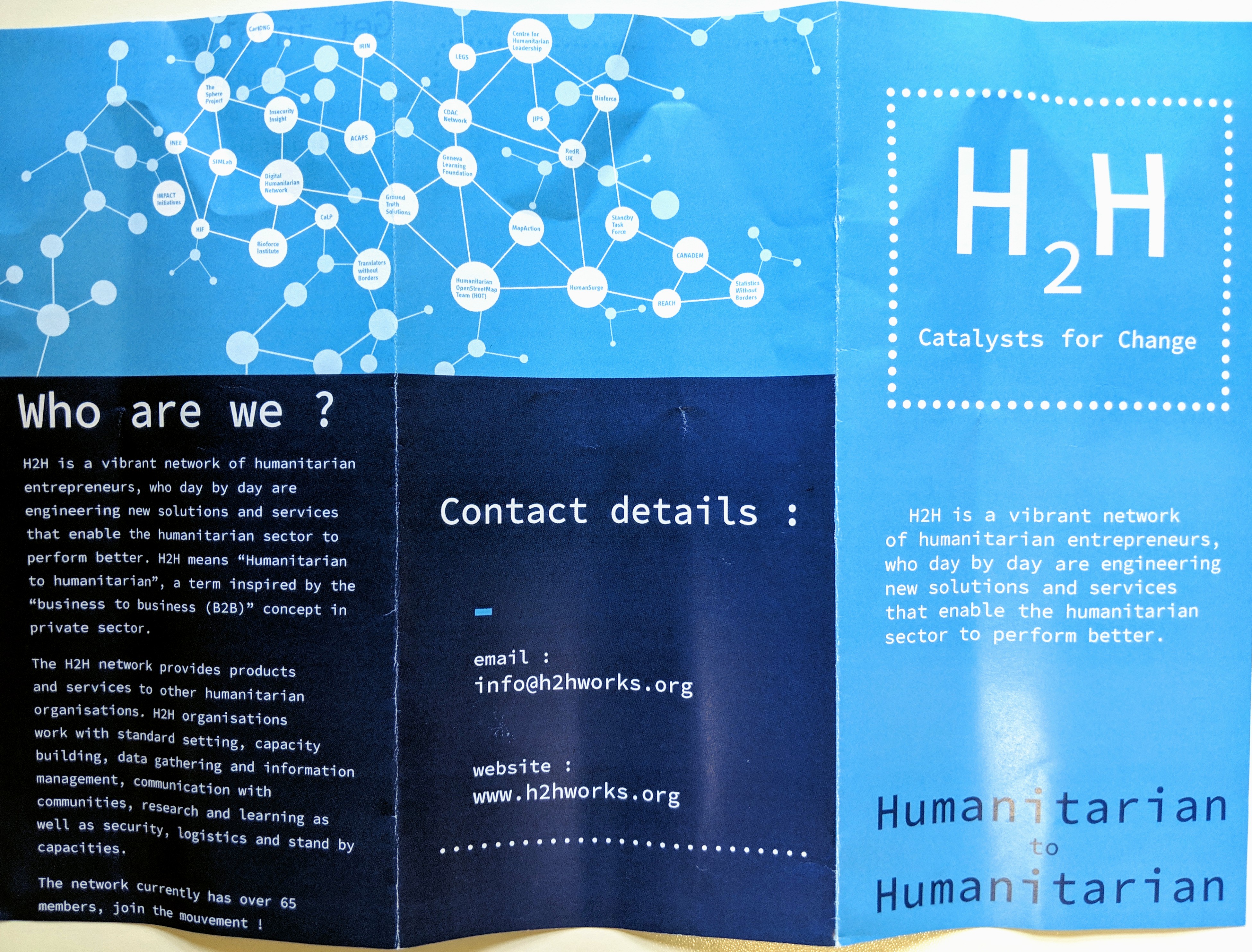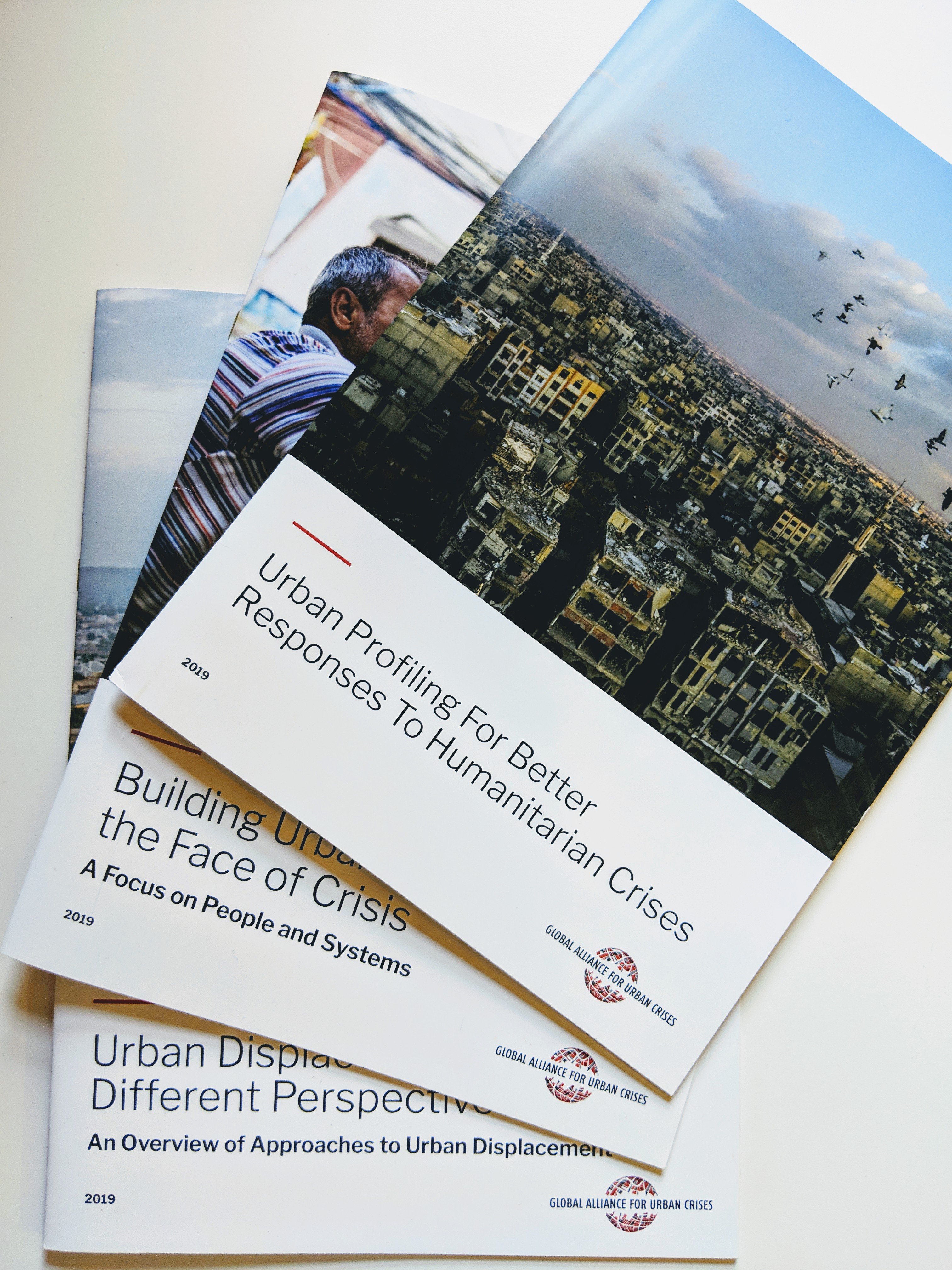News — 22 February, 2019
Humanitarian Networks and Partnerships Week Roundup
.jpg)
Humanitarian Networks and Partnerships Week is a week when more than 25 networks and partnerships hold annual meetings in Geneva. This year, the event was held from February 4-8 and co-chaired by OCHA and the Swiss Agency for Development and Cooperation (SDC). HOT is a member of two of the networks: the Humanitarian to Humanitarian (known as the “H2H Network”) and the Global Alliance for Urban Crises.
Here are a few highlights from the week, and how they relate to HOT:
HOT and the H2H Network
The H2H Network is made up of humanitarian organizations that provide products or services to other humanitarian organizations - similar to the “business to business” or B2B model. The H2H concept got its start around the time of the 2016 inaugural World Humanitarian Summit in Istanbul. It’s now estimated that there are more than 70 such H2H organizations in Europe and North America alone.
 The H2H brochure
The H2H brochure
There is some exciting potential around H2H, and here’s why:
-
First, it builds on the concept of the Digital Humanitarian Network but takes it to the next level. A number of our longstanding DHN partners such as Translators Without Borders, MapAction, CartONG, and Standby Task Force are also H2H members. Through these members and others such as ACAPS, IDMC, IMPACT Initiatives / REACH, IRIN, RedR UK – we go beyond “digital” humanitarianism to include organizations providing valuable services both remotely and on the ground.
-
Second, donors have recognized the potential. DfID has granted the network £3.3 million over 3 years to support humanitarian response by H2H members. The fund will be managed by Danish Refugee Council.
-
Third, design of the services provided by the network and its members and the way funding gets disbursed was entrusted to the H2H network itself. In Geneva, we made some significant progress on this in facilitated sessions, thanks to a small but talented group of professionals leading the “secretariat” of the network including Jude Burchett (previously with ACAPS) and Rebecca Petras (previously with Translators Without Borders).
 Christina Wille of Insecurity Insight and Martin Noblecourt of CartONG present thoughts on the H2H funding mechanism
Christina Wille of Insecurity Insight and Martin Noblecourt of CartONG present thoughts on the H2H funding mechanism
- Finally, with the size and diversity of the network’s members, there is a huge potential for collaborations and “packaging” humanitarian services in new ways. Assessment providers like ACAPS could inform or be informed by geospatial data or map products produced by HOT, MapAction or CartONG. Voices of affected people could be captured and reported by organizations such as Internews or GroundTruth Solutions. Access to clean and safe drinking water could be informed by HOT and Ground Water Relief opening up datasets on wells, boreholes and water systems. Safety and security of operations on the ground could be improved by organizations like Insecurity Insight. These are only but a few H2H member organizations.
Global Alliance for Urban Crises
The Global Alliance for Urban Crises is a global, multi-disciplinary and collaborative community of practice. It is a ‘network of networks’ working to prevent, prepare for and effectively respond to humanitarian crises in urban settings. One of the unique aspects of the Alliance is that it brings together groups who don’t typically work together – from UN agencies to NGOs to city mayors to urban planners and built environment professionals.
A key Alliance achievement was the launch of five new knowledge products. HOT, as a member of Alliance Working Group 1, provided input into the Urban Profiling product.
 The knowledge products in beautiful printed form.
The knowledge products in beautiful printed form.
Data and Doing No Digital Harm
A prominent theme of the week was responsible data. Nathaniel Raymond, Professor at Jackson Institute, Yale University brought up key points to challenge norms including proposing “info as aid” and questioning whether it is possible to “do no harm” if we do not know the full implications of the way data is currently used in our sector.
#HNPW2019: we don’t know if the way we use data is humanitarian. We need to move away from innovation and move towards protection before #innovation says @nattyray11 (my fav 🧠 in any humanitarian discussion)@humdata
— Alexandra Sicotte-Levesque (@alexandrasl) February 6, 2019
Former HOT Board member Heather Leson (of IFRC and current OpenStreetMap Foundation President) and Javier Teran of UN OCHA’s Centre for Humanitarian Data co-led a session on data literacy:
Thanks for joining our discussion about #dataliteracy & convening a Data Literacy Consortium with @Federation @humdata Here are our slides - https://t.co/ryMAPOpFpB #hnpw2019 .
— HeatherLeson (@HeatherLeson) February 4, 2019
For more information on Humanitarian Networks and Partnerships Week, please read the official Event Summary or get in contact with me anytime.
- Tyler
All photos CC-BY Tyler Radford except header photo by Anna Francesca Jennings (www.annafrancescajennings.com)

